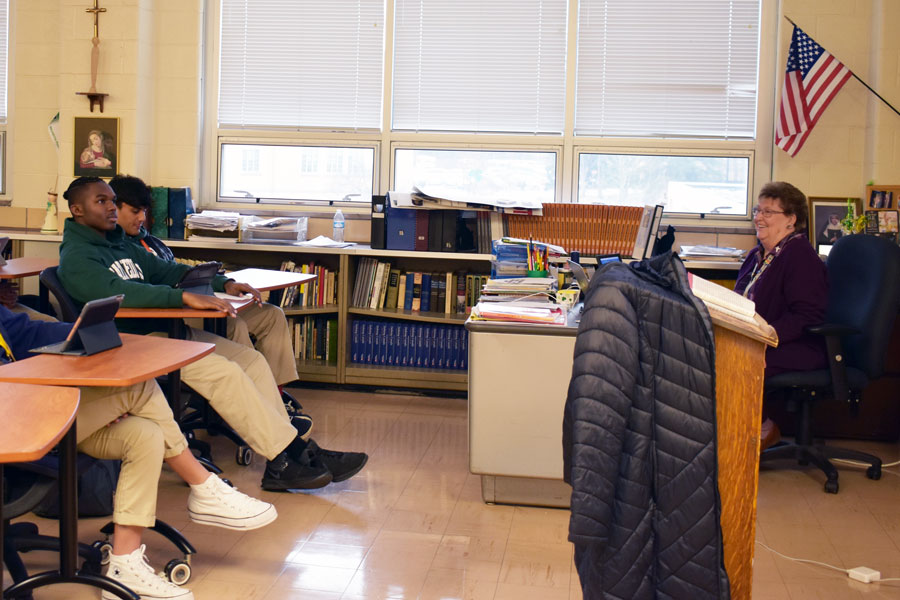History teacher provides perspective on King holiday
Sr. Stewart learned of assassination after registering to vote
History teacher Sr. Mary Ann Stewart provided her perspective on the civil rights movement and the Dr. Martin Luther King Jr. federal holiday.
“The civil rights movement was a movement of course to end segregation and discrimination against African American people,” said U.S. history teacher Sr. Mary Ann Stewart, who provided her perspective on this historical era as we approach the annual Dr. Martin Luther King Jr. federal holiday.
She grew up during this time of racism and segregation, and can recall several instances of discrimination throughout this period, even in her hometown of Terre Haute. “This was during my high school years. I’m seeing this on TV where you have Southern sheriffs beating black people who were simply kneeling in prayer and using fire hoses on little black kids who were protesting. So I’m growing up with all this,” she said.
“Some people think that the movement really took off with the death of Emmett Till because his death really stirred up young black people, high school and college age students,” she said.
By the time she entered high school the civil rights movement started getting more intense. She said, “I knew what was going on. I was beginning to be more and more interested in African-American history. I started reading Ebony Magazine and things like that,” she said. She was strongly in favor of the civil rights movement, she said, and a lot of her classmates were as well.
Catholic priests and nuns marched with civil rights protesters throughout the South and registered African Americans to vote in the 1960s during what was referred to as Freedom Summer.
There were many civil rights activists during this time, Stewart said, but one leader who had a major impact and is well-known is Dr. Martin Luther King Jr. He was a young minister and black leaders asked him to step up. “He became the main leader of what was called the Southern Christian Leadership Conference,” Stewart said.
King started this new civil rights leadership organization and started using non-violent protests. “I remember the night that I registered to vote, when I came back I was told that somebody yelled out our dormitory window that Martin Luther King had just been shot. That made a big impression on me,” she said.
King is one of the reasons why Stewart became a U.S. history teacher. She first started teaching elementary school children because she thought that was the best way to live out her life as a Sister, “but as I was going through college (during the movement) with all the protests and the assassinations of Dr. King and (Senator) Robert Kennedy a couple months later, I began to take more history classes by the time I was finishing college. So I decided to switch over by the time I got my Masters to social science education.
The civil rights movement had a major impact on American society and will remain a significant touchstone in U.S. history, although Stewart said that racism and discrimination are still an ongoing struggle in society today. She said, “We are light years ahead of where we were when I was your age, but we still have a long way to go.”
She said that the civil rights movement is still necessary because we’re still seeing white nationalism creeping up today. “It definitely ended a lot of segregation and discrimination in the North as well as in the South, but I think it’s still in process, and there are still a lot of racial (issues) still under the surface,” she said.

Ava Amos is a senior and is the co-editor-in-chief of the Megaphone staff. She is a member of the varsity softball team and enjoys volunteering with the...

Gracie Carr is a senior and a photographer for newspaper and yearbook. She is a member of Student Council, Riley Dance Marathon, National Honor Society...







